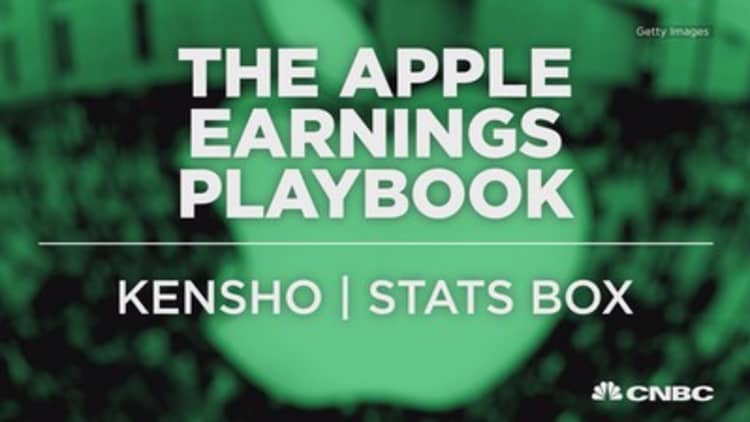
Apple shares typically get a boost after the company reports earnings, especially when Apple beats expectations, which it usually does.
Over the last 10 years, Apple has missed earnings expectations just three times and beat 37 times. Analysis from Kensho, a data analytics platform for financial markets, shows that since 2005, Apple shares have risen 1.2 percent on average in the week following earnings. Apple shares go positive 70 percent of the time.
Read More Gundlach's right about Apple: Analyst
But there are ways to play Apple earnings, which reports after the bell Tuesday, without actually having to buy Apple shares. We used Kensho to crunch the numbers and find some trades that have benefited from Apple's outsized earnings, without the Apple price tag.
An easy strategy is to look at Apple suppliers. If Apple products sell well, it should follow that the companies that make the parts should do well, too. NXP Semiconductors is a standout in this space. Its chips will power the new Apple Pay system, and its shares typically get a boost around Apple earnings.
In the two weeks after Apple earnings, NXP rises 2.9 percent on average—outperforming the and even Apple. In the two weeks leading up to the report, shares rise by 3 percent on average and trade positive 70 percent of the time.
Read More Cramer: Why Apple could easily hit $140
Kensho data also suggest that Apple's stellar earnings performance has weighed on the competition.
Companies to avoid when Apple reports include Dell, Microsoft and Blackberry. In the two weeks following earnings announcements, they underperform Apple and the broader markets. Dell has traded negative more than half the time and fallen a cumulative 11 percent over these periods since 2005.
On occasion, Apple likes to really surprise markets with a big beat. Since 2005, the tech giant has trumped forecasts by 10 cents or more 11 times. When that happens, wireless carrier Sprint is a consistent beneficiary, rising more than 3 percent on average in the following five trading days. Apple itself only rises 0.4 percent on average in these instances, underperforming the S&P 500.
Disclosure: NBCUniversal, parent of CNBC, is a minority investor in Kensho.


